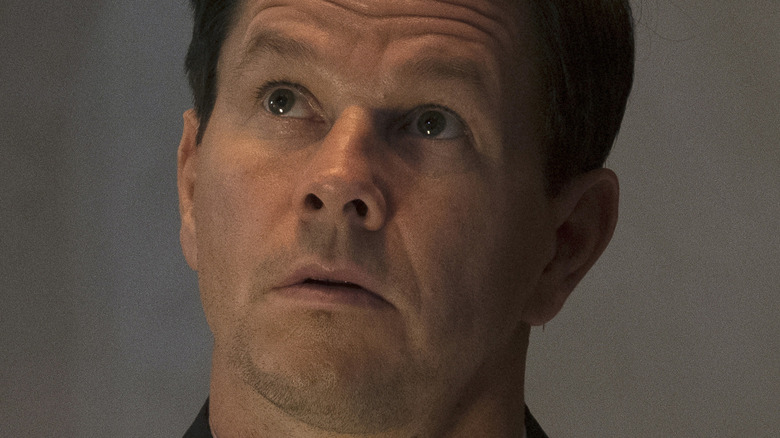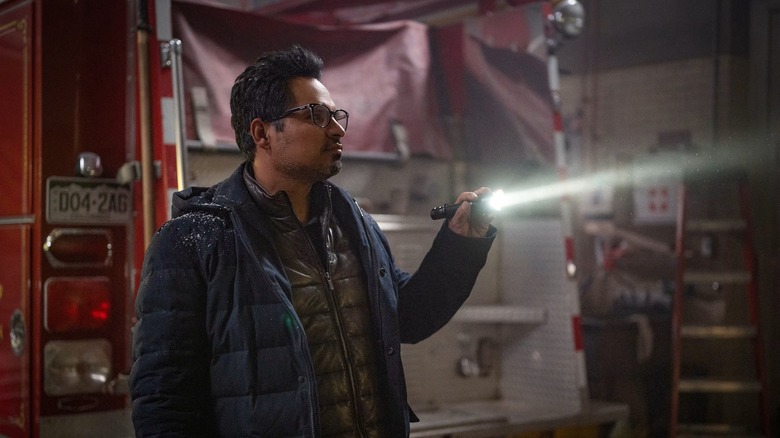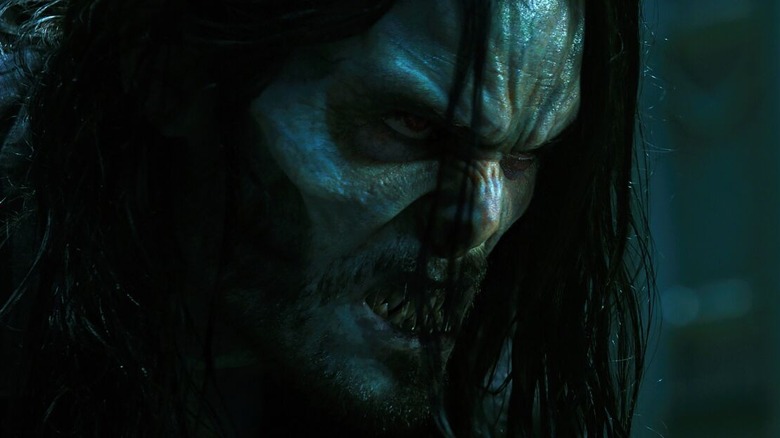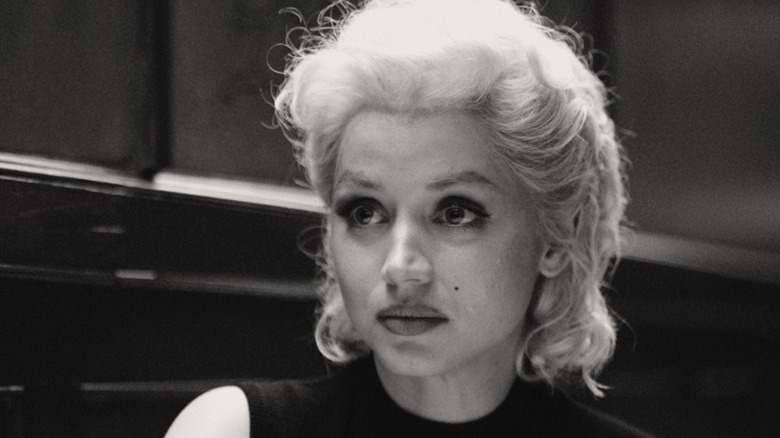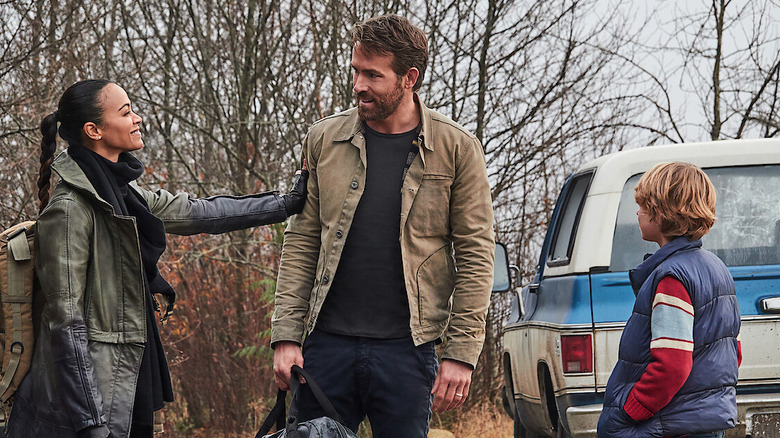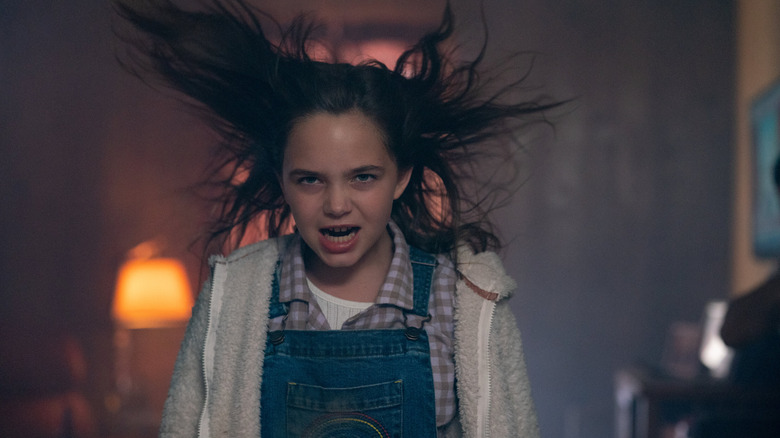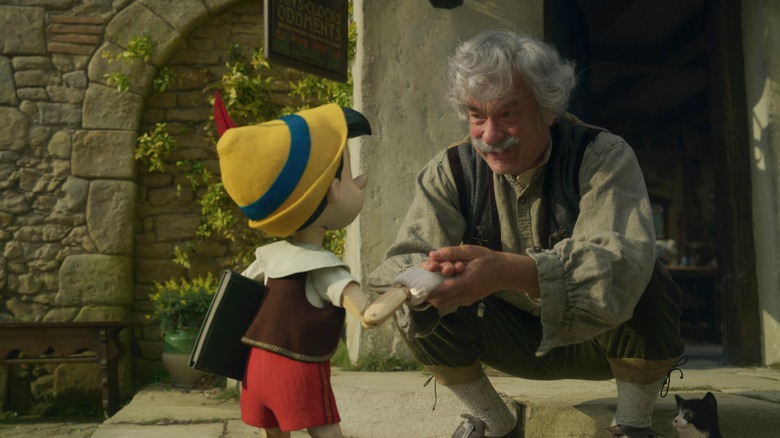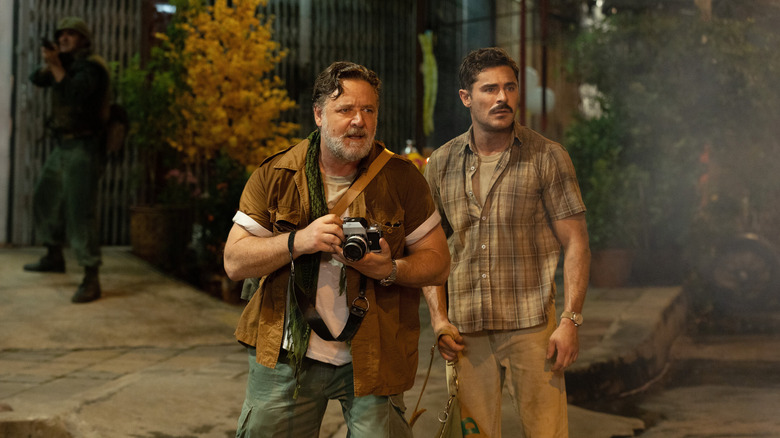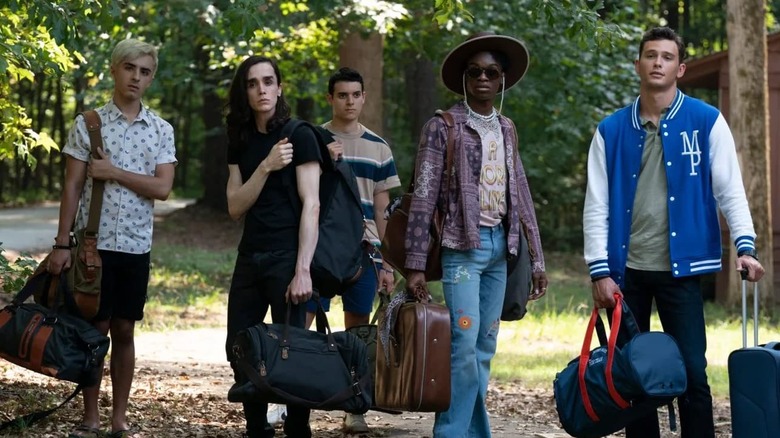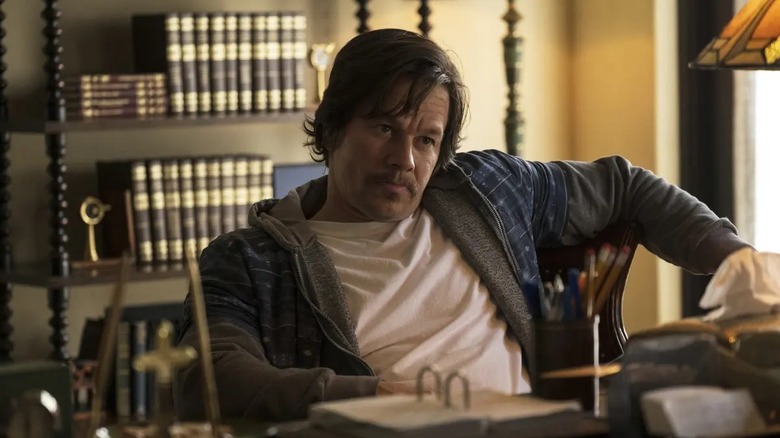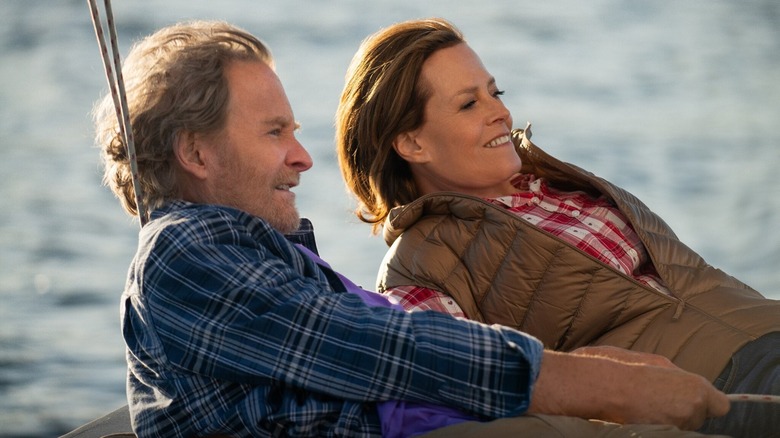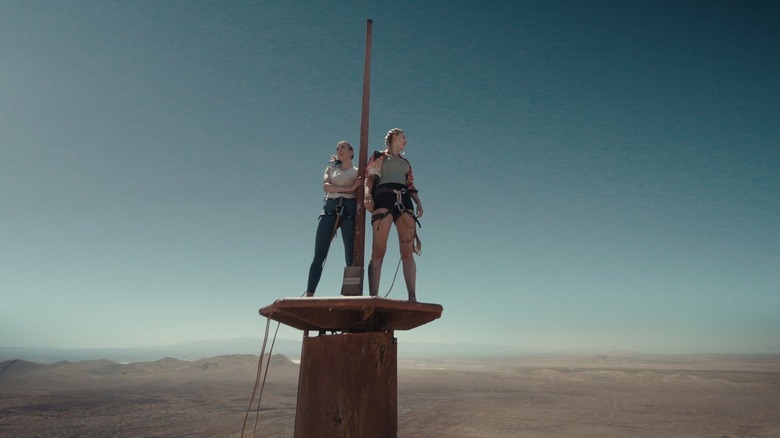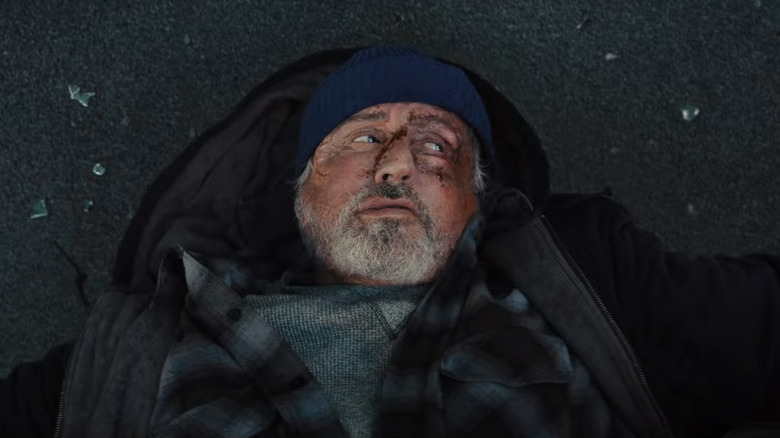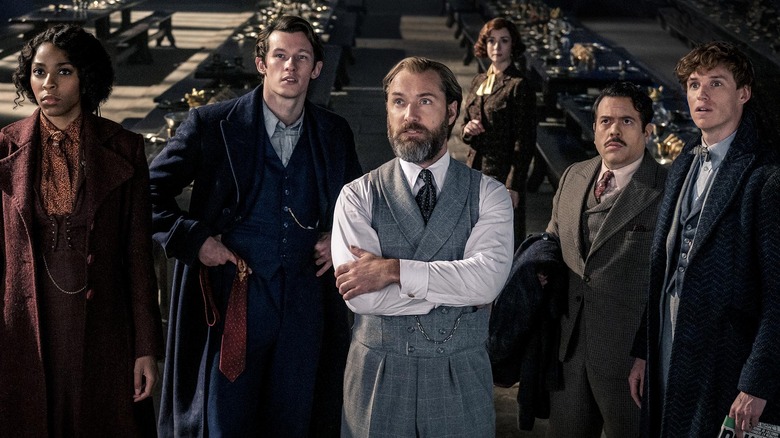The Worst Movie Moments Of 2022
2022 has been jam-packed with great movies from around the world in all genres, but that doesn't mean there weren't also major misfires. On the contrary, several motion pictures throughout 2022 registered as flat-out bad, despite having a lot of promise in their respective narratives or cast. While experiencing such subpar movies, there's often a moment when you realize that what you're watching really is going to be terrible. It's a moment when all the issues of a single motion picture seem to crystallize at once, like the picture that you're putting together in a puzzle coming into view. Sometimes such bad movies can be a tedious slog to get through, but there can be some exhilaration when those moments occur, since they offer clear illumination of why something isn't working.
Those kinds of moments, the very worst movie moments of 2022, abound in some of the year's weakest titles. These movies certainly vary greatly in tone and story, covering everything from Mark Wahlberg as an unlikely priest to Jared Leto as a monstrous doctor to even a horror film that makes "Dallas Buyers Club" look as trans-positive as "Lingua Franca." But across all these features, one can find those moments that serve as both the nadir of the films they inhabit and a guide to what went wrong with some of the worst movies of 2022.
Michael Peña's awkward death in Moonfall
Stepdads do not fare well in the works of Roland Emmerich. It's just a fact of his filmography at this point. This stalwart tradition continues with Tom Lopez (Michael Peña), a car salesman in "Moonfall" who has also married the ex-wife of former astronaut Brian Harper (Patrick Wilson). While other movies might frame a new husband character like Lopez as an antagonist, the script for "Moonfall" often forgets to give Lopez much of a personality to speak of. The charismatic Peña can only do much with such a thinly sketched character, and even Lopez's death is laughably forgettable.
This demise comes in the third act, when the Moon has come close enough to Earth to severely affect the oxygen levels of the planet. While getting across Colorado, Tom notices his youngest daughter no longer has any oxygen. This is when he gives her his oxygen supply, simultaneously guaranteeing her survival but his doom. What should be a momentous gesture of sacrifice is hampered by strange framing and editing that refuses to let the camera linger on our fallen hero. The incredibly artificial nature of the digital backdrops further undercut this sacrifice, since it just looks like these two characters are walking across a soundstage rather than an apocalyptic wasteland. The only thing this hollow screen death accomplishes is ensuring that "Moonfall" continues the trend of stepdads faring poorly in Roland Emmerich movies.
The generic final battle in Morbius
As "Morbius" begins to wind down, Dr. Michael Morbius (Jared Leto) and his former friend Milo (Matt Smith) engage in a showdown between good and evil. Both are endowed with vampire powers (though Milo is using his for evil), so the two are able to use their newfound abilities to harm one another in a very over-the-top duel. What should be a tremendous fight enhanced with supernatural gifts, not to mention a tragic deterioration of a once tender friendship, instead just lies there lifeless on the screen devoid of any emotion.
It's just not very compelling watching two undercooked characters duke it out in a CG-heavy fight. Plus their vampire powers aren't very interesting, especially Morbius's ability to command legions of bats like he's the lead character of "Dracula Untold." To rub salt into the wound, the showdown takes place in an underground sewer devoid of color, bright lighting, or any interesting backdrops for these vampires to fight against. It's as visually drab as the fight choreography and camerawork. This big fight between good and evil signals that the end of "Morbius" is near. Given how stagnant this entire skirmish is, you'll cheer the moment the credits begin to roll.
A pivotal fetus conversation in Blonde
A little over halfway through "Blonde," things seem to be going well in the life of Norma Jeane Mortenson, aka Marilyn Monroe (Ana de Armas). Now married to Arthur Miller (Adrien Brody), Norma has a good life, a splendid garden to attend to, and a baby on the way. While working on her flowers, however, Norma experiences a sudden detour into past trauma when her unborn fetus begins to talk to her, criticizing her and specifically begging her not to abort it like her last child. The camera cuts back and forth between a distraught Norma in the garden and an unmoving CGI fetus (its dialogue conveyed in voiceover) inside her stomach.
There's a lot that's baffling about this moment, including the decision to try and work this entire concept as straightforward drama. There's just no way to pair images of a non-anthropomorphized fetus with voiceover from a child actor and not have it come off as goofy, especially when it's played this seriously. What makes it worse is that Ana de Armas is acting her heart out in the sequence, all in an attempt to inject any kind of meaningful pathos into a scene that's doomed from the start. Like so much of "Blonde," this sequence has ambition to spare, but the actual execution leaves so much to be desired.
A superhero landing in The Adam Project
"The Adam Project" is a mostly listless enterprise that struggles to evoke much of a reaction in any form from the viewer, but it comes alive in its climax for all the wrong reasons. In the finale, 12-year-old Adam Reed (Walker Scobell) decides to make a grand entrance when saving his older self (played by Ryan Reynolds) from a swarm of baddies. Adolescent Reed arrives just in the nick of time and is armed with a futuristic weapon to boot. As he arrives in front of his older self, Reed lands on the ground with one knee bent in front of him and, as he rises, murmurs "superhero landing," a recreation of the same line and action from the first "Deadpool."
To put it simply, this is a terribly stupid moment that's downright infuriating if you think about it too much. It makes no sense in the context of the movie (there's been no mention of "Deadpool" up to this point) and it only exists to remind people of another Ryan Reynolds movie. In this nonsensical moment of fan service, "The Adam Project" lays bare its shameful inability to create anything new and exciting for viewers, which is why it's settling for rehashing "Deadpool" catchphrases from six years earlier. It's not a good sign when the only emotion your sci-fi blockbuster inspires in viewers is resentment and indignation.
The dead mom reveal in Firestarter
In the 2022 remake of Stephen King's "Firestarter," Charlie (Ryan Kiera Armstrong) is a young girl with the ability to generate flames out of thin air, a special talent that can't be concealed forever. One night, a deadly government operative named John Rainbird (Michael Greyeyes) shows up to her home to retrieve the youngster. Charlie's mom, Vicky (Sydney Lemmon), tries to ward off this attacker before her daughter comes home. However, after Charlie arrives, she quickly finds out that her mother has perished at the hands of Rainbird. The reveal of a child losing her mom is indifferently depicted in an awkward shot where Vicky's corpse lurches out of a previously-closed closet in the background and tumbles to the floor.
This reduces a critical moment in the story to something just in the background, with the camera subsequently never lingering on the death long enough for it to have an impact. Worst of all, having a body just tumble out of a closet like this, as if Vicky's corpse was a bunch of precariously-placed paint cans, can't help but make one giggle at what should be an emotionally devastating turn of events. It's a staggeringly miscalculated moment that bungles several key character developments (namely Charlie's growing rage and the establishment of Rainbird's deadly skills) at once, and one of many "Firestarter" scenes that just goes up in smoke.
Pinocchio's trip to school in Pinocchio
Disney's 2022 live-action remake of "Pinocchio," much like its animated counterpart, features a scene where the titular wooden boy (here voiced by Benjamin Evan Ainsworth) walks off to school. In this incarnation, though, Pinocchio takes the time to explore the wider world before he gets to the schoolhouse. This includes an encounter with an animal's bowel movement, with Pinocchio initially staring in awe at the pile of dung. The camera lingers as this CG entity inspects a collection of realistic-looking feces, a sight that was sorely missing from Walt Disney's original animated masterpiece.
As if that wasn't bad enough, Pinocchio's attempt to walk to school, much like in the original animated version, ends up involving his first encounter with "Honest" John (here voiced by Keegan Michael-Key). In the 2022 iteration, "Honest" John keeps dropping grating topical references designed to please any adult viewers still watching this movie. As John prattles on about Pinocchio having the chops to be "an influencer" and suggests "Chris Pine" as a stage name (before dismissing that moniker as something "that would never work"), it becomes quickly apparent that none of this is very funny. This version of "Pinocchio" tries hard to wring laughs out of the audience, but it takes more than showing feces and name-dropping influencers to make people giggle. Pinocchio's trip to school in the remake encapsulates the flawed comedic and narrative sensibilities that sink this whole endeavor.
Remembering New Year's Eve in The Greatest Beer Run Ever
As "The Greatest Beer Run Ever" begins, John "Chickie" Donohue (Zac Efron) is looking around and realizing that almost every one of his buddies has gone overseas to fight in the Vietnam War. Remembering better days gone by, Donohue proceeds to reminisce about a New Year's Eve that he shared with one of his closest pals, as the duo raced to watch the ball drop while heavy sheets of snow fell around them. The screenplay (partially penned by director Peter Farrelly) intends for this glimpse into the past to provide a sweet contrast to the brutality of Vietnam that will dominate the rest of the runtime.
Unfortunately, Farrelly and cinematographer Sean Porter's filmmaking undercuts the intended emotion of this sequence. This entire vision just looks distractingly cheap and small: it doesn't feel like it takes place on a crowded New Year's Eve but rather on a soundstage where one might film a sitcom. Even worse, the heavy-handed dialogue exchanged between the two characters onscreen is laughably bad. Nobody feels like a human being in this flashback — they just feel like they're arranging emotional and narrative beats that "Beer Run" can pay off later. New Year's Eve can often be a time for joy and celebration, but spending time with this holiday is only a major detriment for "The Greatest Beer Run Ever."
The handling of Alexandra in They/Them
The concept of setting a horror movie at a conversion camp sounds like it's rife with promise and potential. Unfortunately, "They/Them" was a disaster, a shockingly incompetent feature that was only scary in how unimaginative it was. For the perfect proof of this, look no further than an early plot development for the character Alexandra Traven (Quei Tann). A trans woman initially presumed to be a cis lady by the counselors at the conversion camp she's trapped in, Alexandra's gender identity is revealed when a counselor catches her showering. The head of the camp, Owen Whistler (Kevin Bacon), proceeds to disparage her and force her to stay in the boys' cabin afterward for "lying" to the counselors.
"They/Them" is clearly depicting the actions of Whistler and the other counselors as evil; we're supposed to be on Alexandra's side. However, that doesn't erase the fact that this is still a 2022 movie that almost exclusively defines a trans woman character by her genitals. Plus Alexandra goes through all this hardship and later on doesn't even stick around for the finale, where she could get an exciting, cathartic moment to cap off her storyline. She's instead just babysitting the younger captives. The concept of trans people, especially trans people of color like Alexandra, experiencing immense hardships in Western society is not a new or novel concept. Movies have to be smart in how they depict that reality lest they contribute to oppression like "They/Them" did.
A big prison speech in Father Stu
Towards the end of "Father Stu," the film's titular lead, Stuart Long (Mark Wahlberg), now in the throes of inclusion body myositis, visits a collection of prisoners with fellow priest Jacob (Cody Fern). Initially, the prisoners are more confrontational than welcoming of the duo since Jacob's doing all the talking and doesn't know how to speak to these men. But Stu, having experienced countless run-ins with the law and all kinds of turmoil, can speak their language and proceeds to deliver a passionate speech about how God is the only one who will always have their back.
On paper, this should be the showstopper sequence of "Father Stu," a moment where Stu demonstrates that what makes him unique as a priest is also what makes him good at this job. However, the entire scene lacks any panache or drama in the hands of director Rosalind Ross. Any dramatic build-up or creative camera angles that could accentuate the importance of these words is eschewed in favor of flat filmmaking. The erratic editing by Jeffrey M. Werner also constantly undercuts any momentum in Wahlberg's delivery, while the speech itself is so generic that it might as well have been ripped from a bunch of plaques you can buy at Hobby Lobby. Unsurprisingly, the movie where Mark Wahlberg plays a bad boy priest was bad, but this prison-set moment alone may shock viewers in its overwhelming tediousness.
A ruined day at the beach in The Good House
Early on in "The Good House," protagonist Hildy Good (Sigourney Weaver) has her time at the beach dramatically upended when new members of her community clash with a family she's known for years. Rebecca (Morena Baccarin) and her son are squabbling with a young autistic boy named Jake (Silas Pereira-Olson), the son of Cassie (Georgia Lyman). It seems Jake took a truck belonging to Rebecca's kid and won't give it back. Rebecca keeps insisting that an increasingly distraught Jake return the toy, only for Cassie to intervene and explain that her son, now in the middle of a meltdown, is autistic. This is followed by Rebecca almost dropping the awkward phrase "He didn't look autistic," before Cassie and Jake leave in a huff.
"The Good House" is not a movie brimming with imagination in many respects, including how it approaches alcoholism or fourth-wall breaks. But the trite autistic stereotype trotted out here is immediately eye-rolling. Worst of all, it only exists to firmly establish Jake (who only appears one other brief time before this scene) to the audience so that he can later be reduced to a MacGuffin that drives third-act motivations for neurotypical characters. The day Hollywood productions realize that autistic children go through more emotions than meltdowns or confrontations with other kids will be a glorious day. Until then, moments like this scene from "The Good House" will leave you cringing like there's no tomorrow.
The big twist in Fall
Things have gotten pretty dark for "Fall" protagonists Becky Connor (Grace Caroline Currey) and Shiloh Hunter (Virginia Gardner) by the time the third act of this movie rolls around. Trapped on the very top of a TV tower that's 2,000 feet tall, they have no way to get down and their supplies are running out fast. But things are about to get a lot worse, as Becky realizes she hasn't been talking to Shiloh for the last couple of days. Shiloh perished while trying to retrieve a backpack and Becky has been hallucinating her ever since. She's totally alone now up where the clouds call home.
Throwing this kind of twist on top of everything else in "Fall" already feels like putting a hat on top of a hat, but screenwriters Scott Mann (who also directed) and Jonathan Frank really bungle this plot turn thanks to their heavy-handed setup. Earlier moments, like Becky plainly asking Shiloh why she didn't even try to catch some falling supplies, use ham-fisted dialogue to make it clear something is askew with one of our lead characters. Rather than feeling like an enhancement to an already intense scenario, this awkward reveal just lays bare what was apparent to most viewers ages ago. "Fall" has its moments of vertigo-inducing intensity, but more often than not, its attempts at creating thrills go about as well as this clunky reveal of Shiloh's gruesome death.
The break-in at the police station in Samaritan
"Samaritan" suffers from many problems, including leading man Sylvester Stallone barely seeming awake as a superpowered individual in hiding. But one of the gravest flaws in Bragi F. Schut's screenplay and Julius Avery's directing is the bizarre tone of the movie. At times, like when the main villains torture and then shoot a man they're interrogating for information, "Samaritan" is channeling grimy 1980s action fare. Other scenes, like any interactions between Stallone's character and a cutesy fanboy neighbor, take on the vibes of a kid's movie. These shifts never feel cohesive and keep inducing tonal whiplash in the viewer.
Rarely is this tonal problem more apparent than in a scene where primary antagonist Cyrus (Pilou Asbæk) and his crew break into a police station to steal a mighty hammer that belonged to the fallen supervillain Nemesis. In taking down the cops and getting to the storage room, Cyrus and his allies constantly engage in behavior that makes them seem like rejected "Spy Kids" baddies rather than formidable opponents for Sylvester Stallone to beat up. Once the sequence shifts gears and we're supposed to be petrified at Cyrus clutching this hammer, the intended ominous vibes never come through. "Samaritan" wants to make its villains goofy and threatening but, as evidenced by this clumsy police station break-in sequence, it does not have the chops to pull off such a tricky tonal balance.
A hollow wedding in Fantastic Beasts: The Secrets of Dumbledore
"Fantastic Beasts: The Secrets of Dumbledore" concludes with a wedding between Muggle Jacob (Dan Fogler) and magic-user Queenie (Alison Sudol). Taking place in Jacob's New York City bakery, this union between the longtime lovers is supposed to send the audience out in on emotionally satisfying note. Instead, it's just one of many miscalculated set pieces scattered throughout the messy third entry in this "Harry Potter" spinoff series.
Chief among the problems here was the decision to have Queenie betray Jacob and go work for the franchise's villains in the last movie, "The Crimes of Grindelwald." Separating the two for so long and putting this enormous wedge between them ensures that the audience can't get invested in their partnership. Worse, there's barely any attempt to make their relationship seem believably repaired throughout "The Secrets of Dumbledore." Without any kind of character development, this ending to "The Secrets of Dumbledore" just comes off as hollow, as well as a sad reminder of how few of the "Fantastic Beasts" characters ever left a meaningful impression over the course of three movies.
